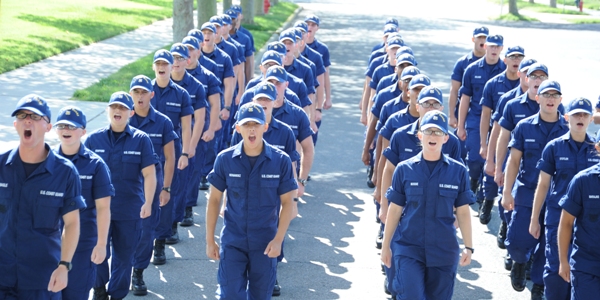At the far southern tip of New Jersey, the Coast Guard Training Center at Cape May is one of the larger neighborhoods of young families with school-age children in a gentrified seaside resort.
On Tuesday those families missed their first paycheck in the longest federal government shutdown ever. In Cape May and around other Coast Guard bases along the coasts, the civilian community is rallying to help.
“The Coast Guard Training Center is just an integral part of the city of Cape May,” said Gregg Coffey, owner of the C-View Inn, a Cape May restaurant that is discounting meals by 50% for Coast Guard personnel during the shutdown.
“It’s a struggle. These kids go paycheck to paycheck. I’ll run with this as long as it’s closed,” said Coffey.
Veterans and community groups have been collecting donations for training center families in anticipation of no pay this week, and similar efforts have popped up around the country. From New England to Florida and California, help is coming from donations and local businesses.
Meanwhile the Coast Guard is still very much in business, albeit without pay; unlike other branches of the military, the Coast Guard is part of the Department of Homeland Security and thus subject to the partial shutdown. Amid the Washington political debate centered on the Trump administration’s demand to fund a wall on the southern border, the Coast Guard has been publicizing its own efforts to interdict migrant smugglers at sea.
“Our USCG members continue to save lives every day, deter human trafficking, and conduct global defense operations,” Commandant Adm. Karl Schultz wrote in a Facebook post Monday.
“While our Coast Guard workforce is deployed, there are loved ones at home reviewing family finances, researching how to get support, and weighing childcare options—they are holding down the fort,” Schultz wrote. “Please know that we are doing everything we can to support and advocate for you while your loved one stands the watch. You have not, and will not, be forgotten.”
In a Tuesday posting, Schultz said the Coast Guard Mutual Assistance Program has received a $15 million donation from USAA, a San Antonio, Texas-based bank that serves military personnel. USAA had come under fire for only offering interest-bearing loans to Coast Guard members who need to get through the shutdown, and now Schultz says the American Red Cross will partner with the assistance program to distribute those funds.
In New Jersey, Cape May County officials are sending social service workers to show Coast Guard members how to apply for aid — including the federal Supplemental Nutrition Assistance Program (SNAP), a low-income food aid program that has been endangered itself in budget politics.
Coffey says the C-View Inn will keep offering its discounted meals as long as necessary to Coast Guard members, whom Coffey estimates make up 10% to 15% of his customers.
“The C-View is a Coast Guard bar. It used to be called Buoy 1. I’ve tried to protect and enhance the relationship,” said Coffey. When recruits graduate from basic training, their families and company commanders celebrate there.
Coffey is planning to install a mahogany plank for the company commanders to mount their pins, near the display of Coast Guard aviators’ patches dating back to when helicopter crews operated out of Cape May. Since the aviation units relocated to the Atlantic City air station about 40 miles north, the pilots still swing by the C-View.
Schultz says as far as he can tell this is the first time U.S. military personnel have gone unpaid because of a budget dispute. Regardless of their personal politics, people involved in helping the Coast Guard families are appalled that politicians can’t get a deal together.
“Isn’t it weird to say your country is closed? How can that be?” said Coffey. “I just try to imagine someone telling that to Abraham Lincoln.”





